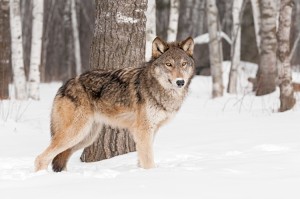Welcome to Wolfmonth
January 6, 2020
The month of January marks the beginning of every new year on the Gregorian calendar. In the Northern Hemisphere, January is the first full month of winter, and it is typically one of the coldest months of the year. (In the Southern Hemisphere, January is known for warm temperatures during the first full month of summer.) Because of its harsh weather, January in the Northern Hemisphere has long been a time of hard outdoor living for people and animals. In North America, some Native Americans referred to the time of year as “wolf moon” because hungry wolves could be heard prowling near their villages. Similarly, the Anglo-Saxons of Great Britain called the first weeks of winter Wulf-monath (Wolfmonth) because wolves came into villages in search of food.

The month of January is associated with harsh outdoor living–and wolves–in the Northern Hemisphere. Native Americans and Anglo-Saxons both named the time of year for the hungry wolves they encountered. Credit: © Shutterstock
Cold and wolf-infested January is named for Janus, the Roman god of beginnings. According to Roman legend, the ruler Numa Pompilius added January and February to the end of the 10-month Roman calendar in about 700 B.C. He gave the month 30 days. Later, the Romans made January the first month of the year. In 46 B.C., the Roman statesman Julius Caesar added a day to January, making it 31 days long.
January may be dreary, but the month’s holidays can brighten the mood. January 1 is celebrated as New Year’s Day in most countries. Most Christian churches celebrate Epiphany on January 6, the 12th day after Christmas. The holiday commemorates the arrival of the wise men from the East bearing gifts for the infant Jesus. In Latin America, this day is celebrated as Día de los Reyes Magos (Three Kings Day). Children receive gifts on this day, supposedly from the wise men—the magi, or magos. In Sweden, St. Canute’s Day (also spelled Cnut or Knut), is celebrated on January 13. This holiday marks the end of the Christmas season. In Norway, a similar holiday is called Tyvendedagen (Twentieth Day), because it falls on the twentieth day after Christmas. Many Hindus celebrate a harvest festival called Makara Sankranti or Pongal in mid-January. During this holiday, many people bathe in the sacred Ganges River. They give alms (charity), eat newly harvested rice, and eat sweets to symbolize the wish for sweet words throughout the year. In the United States, the third Monday of January is a federal holiday in honor of the civil rights leader Martin Luther King, Jr., whose birthday falls on January 15. In Australia, people celebrate Australia Day on January 26. The holiday commemorates the arrival of the First Fleet, the ships that brought the first immigrants to Australia in 1788.


